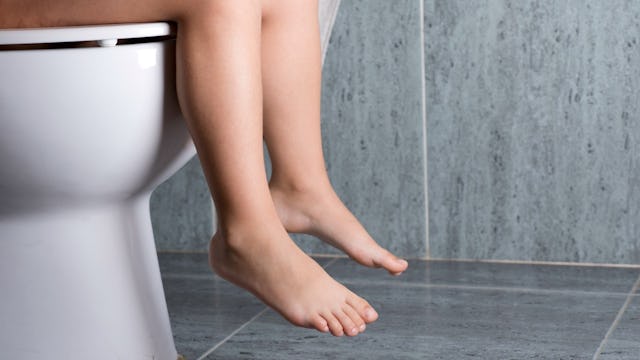Why Childhood Constipation Is So Common, And How Parents Can Help

Raise your hand if you enjoy being constipated. I’ll wait… No? That’s odd.
Of course, I’m kidding. I hate constipation. Everyone does. The cramps. The struggle… all of it is incredibly uncomfortable, right? Well, one thing we don’t often talk about is child constipation, which is a fairly common issue. Only kids don’t really understand what’s going on, so they often suffer in silence. This is a sad story, actually. One thing parents don’t often consider is how emotionally difficult going number two while at school (or daycare) can be for children. They end up holding it in, and it creates of vicious cycle of discomfort and fear of using the toilet.
Like a lot of children, my middle daughter hated going number two all together. She avoided it at all costs, even at home. At school? Forget about it. She’d rather die, and so she ended up very constipated. A lot. And trust me, it was miserable for all of us.
But I think the hardest part about all of it was that we couldn’t exactly figure out what was wrong. At first we thought it was the flu because her stomach hurt so bad. Then we wondered if it was something she ate. At one point we thought it was anxiety. It took us quite a while to understand that she was seriously constipated because she refused to poop at school.
Now listen, I’m a dude. So I’m not going to try and act like I understand a women’s restroom or the etiquette thereof. Men’s restrooms sounds like the trumpet section in a ska band. As long as no one talks or makes eye contact, everything that happens in there, stays in there. But I have heard that things are different when it comes to number two in a typical women’s restroom, and I honestly wonder if that understanding hit my daughter very early, and it had some pretty uncomfortable consequences for her.
So… with children back in school, the question is: what do you do if you think your child might be constipated? Well, Dr. Nina Shapiro, pediatric specialist and author of Hype: A Doctor’s Guide To Medical Myths, tells Scary Mommy that grade school children often struggle with constipation because they try to avoid going to the bathroom altogether, like my daughter did, especially during the school day. Sometimes they’re too shy to ask to use the restroom, other times they hold it in because they don’t want to stop playing. Some kids get too distracted to recognize the need, or they aren’t getting enough fiber, fluids, or exercise.
Now I don’t want to speak for all grade schoolers, but all three of my children probably fall into one of these categories, so it obviously covers a wide swath. Now, like I said above, my wife and I had a difficult time pinning down what was happening with our daughter when she was experiencing constipation, so I asked Dr. Shapiro what to look for, and she mentioned that it can be tricky, particularly when the child is too young to voice what’s going on in their body. A lot of symptoms can go unnoticed, or be misdiagnosed by parents.
But some signs to be on the lookout for are three or fewer bowel movements a week, stomach aches, nausea and frequent urination or bedwetting, as well as a decrease in appetite and increased irritability.
Then again, everything listed above could easily describe most grade school children on a normal day. I assume that’s what makes this all so tricky. But as usual, we parents have to be extra vigilant, and if you do suspect your child might be constipated, it’s best to call or take them to see a doctor to explore the best options for treatment.
Now, one of the best things we can do is get ahead of the problem by doing a few simple preventative measures. When it comes to occasional child constipation, Dr. Shapiro recommends laxatives that are specifically designed to help children, such as Pedia-Lax. According to her, there have been reports of possible side effects like behavioral and speech issues in kids linked to PEG 3350, one of the main ingredients in adult laxatives.
We can also make sure our children eat a well-balanced diet with plenty of fiber and drink water on a consistent basis. Yeah, I know. I rolled my eyes a little there, too. I feel like anything that could be labeled as “well-balanced” or “nutritious” is considered a crime against humanity according to my children, but hey, we are trying to do exactly that, Doc. We are trying. They do make Fiber gummies for kids, and I bet they would get on board with that.
I think the best advice she gave was this, however: “Encourage little ones to use the bathroom when they need to. Whether it’s scheduling a potty break or reminding them to speak up, it can help prevent constipation in the future.”
I talk to my children about a lot of things. I ask about their day. I help them understand how to stand up for themselves and when to fight back and how to be proactive about schoolwork. But I don’t think I’ve ever really discussed poop and restroom advocacy. It’s honestly not something I’ve ever thought of, but now, I guess I’m going to.
Because honestly, no one enjoys being constipated, and if we can help our children avoid it by discussing it openly, and giving tips to not experience it, I think it’s the least we can do.
This article was originally published on